Welcome to a journey of balance and well-being with soothing Ayurvedic Kapha recipes. In this article, I will guide you through the art of Ayurvedic cooking for Kapha dosha, offering a range of delicious and nourishing recipes designed to bring harmony to your body and mind.
Ayurvedic Kapha recipes are carefully crafted to address the imbalances that can arise from excess Kapha energy. By incorporating specific ingredients and spices, these recipes help reduce Kapha imbalances, promote digestion, and enhance vitality.
From warming soups to nourishing main entrees and satisfying desserts, these recipes are thoughtfully designed to pacify Kapha dosha and support your overall well-being. Whether you are looking for Ayurvedic recipes for balancing Kapha dosha or simply seeking healthy and flavourful options, this collection has something for you.
Join me on this journey to balance as we explore the healing power of Ayurveda and the transformative potential of Ayurvedic Kapha recipes. Are you ready to nourish your body, uplift your spirit, and experience the profound benefits of Ayurvedic cooking for Kapha dosha?
Table of Contents
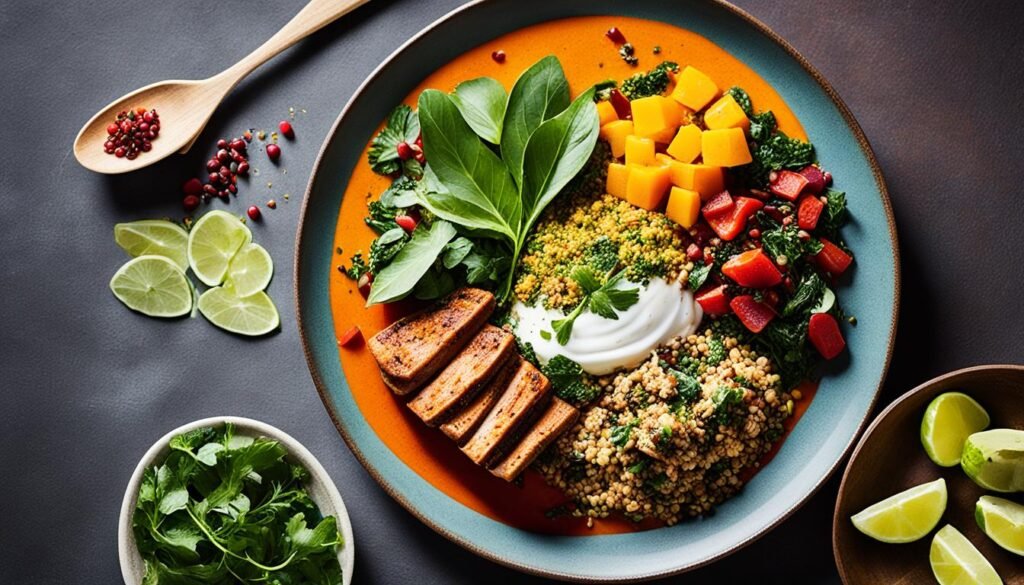
Key Takeaways:
- Ayurvedic Kapha recipes are specifically designed to balance Kapha dosha and promote overall well-being.
- These recipes incorporate ingredients and spices that help reduce excess Kapha energy in the body.
- By following an Ayurvedic diet for Kapha dosha, you can support your body’s natural balance and experience enhanced energy and vitality.
- In addition to recipes, certain lifestyle changes can complement your efforts in balancing Kapha dosha.
- Embrace the holistic principles of Ayurveda and discover the transformative power of Ayurvedic cooking for Kapha dosha.
Understanding Kapha Dosha and its Imbalance
Kapha dosha, one of the three bio-dynamic forces in Ayurveda, along with Vata and Pitta, represents the earth and water elements and plays a vital role in maintaining stability, structure, and lubrication in the body. When Kapha dosha is in balance, it fosters strength, stability, and nourishment for optimal well-being.
However, an imbalance in Kapha dosha can give rise to various symptoms, including lethargy, excess mucus, poor digestion, weight gain, and a sluggish metabolism. Recognizing these signs of Kapha imbalance is crucial to address the need for incorporating Kapha-balancing recipes into your diet.
According to Ayurveda, Kapha dosha embodies qualities such as heaviness, coldness, and dampness, reflecting the characteristics of earth and water. When these qualities are exacerbated, a Kapha imbalance can manifest both physically and emotionally.
“Understanding the unique qualities and signs of Kapha dosha’s imbalance is the cornerstone of addressing and rectifying the issue.”
By recognizing the symptoms of Kapha imbalance, you can take necessary steps to restore harmony and balance through targeted dietary choices and lifestyle modifications.
To gain a comprehensive understanding of Kapha dosha’s influence and learn effective strategies for addressing its imbalance, let’s delve deeper into Ayurvedic principles and the impact of Kapha dosha on our overall well-being.
Understanding Kapha Dosha and its imbalance is key to unlocking the transformative power of Ayurveda in achieving holistic wellness. By incorporating Kapha-balancing recipes and following Ayurvedic principles, you can restore harmony and experience enhanced vitality, improved digestion, and overall well-being.
The Role of Ayurvedic Diet for Balancing Kapha Dosha
Ayurveda emphasizes the importance of diet in maintaining balance and harmony in the body. For individuals with a Kapha imbalance, a Kapha-pacifying diet is recommended. This diet focuses on incorporating foods that are warm, light, and easy to digest while reducing heavy, oily, and cold foods. Pungent, bitter, and astringent tastes are particularly beneficial for reducing excess Kapha energy. By following an Ayurvedic diet for balancing Kapha dosha, you can help alleviate Kapha-related symptoms and support your overall well-being.
Ayurvedic Kapha Recipes for Breakfast
Breakfast is an important meal for balancing Kapha dosha, as it sets the tone for the rest of the day. Kapha-balancing breakfast recipes focus on incorporating light and warming ingredients such as sprouts, grated carrots, lettuce, lemon, and warming spices like black pepper and ginger. These recipes provide nourishment and energy without weighing you down, helping to kickstart your metabolism and keep Kapha imbalances at bay.
Start your day with a refreshing Kapha-Balancing Greens Smoothie. This smoothie combines fresh spinach, cucumber, cilantro, lime juice, and a touch of honey. It’s packed with nutrients and antioxidants to support your body’s natural detoxification process.

| Recipe | Ingredients | Instructions |
|---|---|---|
| Kapha-Balancing Chia Pudding | 2 tablespoons chia seeds1 cup almond milk1 tablespoon maple syrup | In a bowl, mix chia seeds, almond milk, and maple syrup. Let it sit for 10 minutes, stirring occasionally to prevent clumping. Refrigerate overnight or until the mixture thickens to a pudding-like consistency. Serve chilled and enjoy! |
| Kapha-Balancing Vegetable Omelette | 2 eggs1/4 cup chopped bell peppers1/4 cup chopped zucchini1/4 cup chopped onions1/4 teaspoon black pepper1/4 teaspoon dried oregano1/4 teaspoon sea salt | In a bowl, beat the eggs and season with black pepper, dried oregano, and sea salt. Heat a non-stick pan over medium heat. Add the chopped vegetables and sauté for 2-3 minutes until slightly softened. Pour the beaten eggs over the vegetables and cook until set, flipping once. Remove from heat and serve hot. |
If you prefer a heartier option, try the Kapha-Balancing Quinoa Bowl. This recipe combines cooked quinoa, steamed vegetables like asparagus, broccoli, and mushrooms, and a drizzle of tahini dressing. It’s a wholesome and satisfying breakfast that will keep you energized throughout the morning.
Incorporate these Kapha-balancing breakfast recipes into your daily routine to support your body’s natural balance and experience enhanced energy and vitality throughout the day.
Kapha-Pacifying Soups and Soups
Soups are a great way to nourish your body and balance Kapha dosha. These warming and flavorful soups can help reduce Kapha-related symptoms and promote overall well-being. Incorporating Kapha-pacifying soups into your diet is an excellent way to support your body’s natural balance and enhance digestion, metabolism, and circulation.
When it comes to Kapha-pacifying soups, a combination of warming spices and vegetables are often used to create nourishing and delicious recipes. Spices such as coriander, fenugreek, turmeric, and black pepper help stimulate digestion and metabolism, while vegetables like cauliflower and broccoli provide essential nutrients and antioxidants.
Here are a few examples of Kapha-pacifying soup recipes:
- Spiced Cauliflower Soup: A warming and comforting soup made with fragrant spices like cumin, coriander, and turmeric, mixed with cauliflower and vegetable broth. This soup is light, yet satisfying.
- Ginger Turmeric Lentil Soup: This soup combines the anti-inflammatory properties of ginger and turmeric with protein-rich lentils for a nourishing and satisfying meal. It’s a perfect option for a Kapha-balancing lunch or dinner.
- Broccoli and Mung Bean Soup: A nutrient-packed soup that combines the goodness of broccoli and mung beans. The addition of warming spices like cumin and black pepper makes it ideal for stimulating digestion and reducing Kapha-related symptoms.
Kapha-pacifying soups are light, easy to digest, and help balance Kapha dosha. By incorporating these soups into your diet, you can support your body’s natural balance, reduce Kapha-related symptoms, and promote overall well-being.
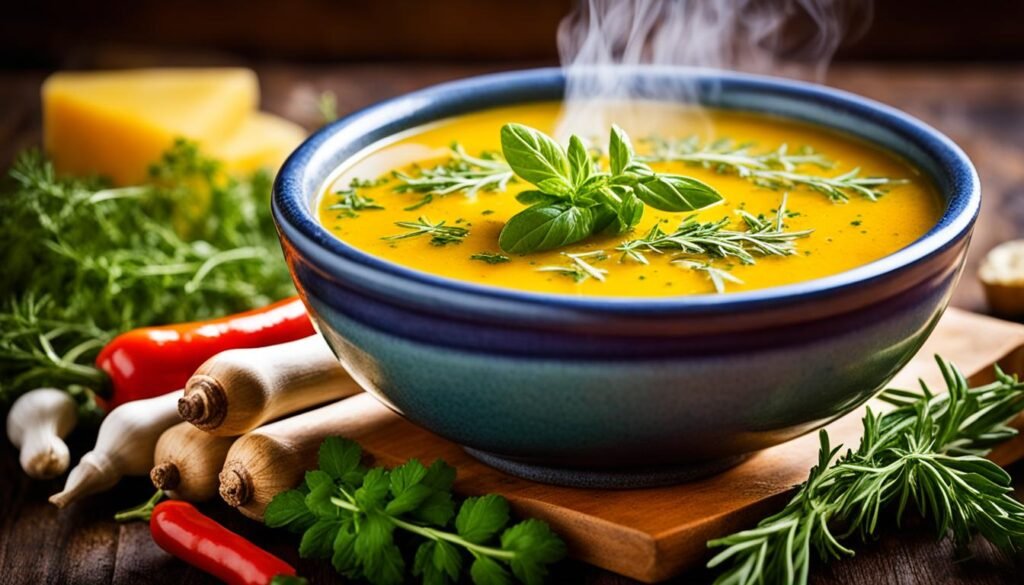
| Benefits | Description |
|---|---|
| Promote Digestion | The warming spices used in Kapha-pacifying soups help stimulate digestion and improve nutrient absorption. |
| Support Metabolism | These soups can help boost metabolism, promoting weight management and increased energy levels. |
| Reduce Kapha-related Symptoms | Kapha-pacifying soups help reduce symptoms associated with Kapha imbalance, such as sluggish digestion, lethargy, and congestion. |
| Promote Circulation | The warming nature of these soups can help improve blood circulation, leading to better overall vitality and well-being. |
Kapha-Balancing Main Entrees
When it comes to the main course, there are plenty of Kapha-balancing recipes that can satisfy your hunger while supporting your body’s natural balance. These Ayurvedic main course recipes for Kapha dosha incorporate ingredients like mung beans, basmati rice, and a variety of spices, all specifically chosen to aid digestion, promote balance, and provide nourishment.
One delicious and highly beneficial main entrée is kitchari. This traditional Ayurvedic dish combines rice and mung beans, along with a blend of digestive spices. Kitchari is light, easy to digest, and provides a complete source of protein, making it an ideal choice for balancing Kapha dosha.
If you’re looking for a gluten-free option, pearl millet flatbread is a great alternative. Made from nutrient-dense millet flour and seasoned with aromatic spices, this flatbread is not only satisfying but also aids in digestion and promotes balance.
Leafy greens with chickpeas
Another flavourful option is a dish that combines leafy greens with protein-rich chickpeas. This combination provides a wide range of nutrients while balancing Kapha dosha. Add in some warming spices like cumin, coriander, and turmeric to enhance the flavours and support digestion.
Salmon burgers
For seafood lovers, salmon burgers are a delicious and nutritious choice. Grilled or baked salmon patties seasoned with Ayurvedic spices like ginger, dill, and lemon not only satisfy your taste buds but also provide omega-3 fatty acids and support a healthy metabolism.
By incorporating these Kapha-friendly main entrees into your diet, you can enjoy flavourful meals while promoting balance and nourishing your body. Remember to choose ingredients and spices that align with your specific Ayurvedic constitution and make adjustments accordingly.
Kapha-Balancing Snacks and Light Meals
Snacks and light meals play a vital role in maintaining balance in Kapha dosha. Instead of indulging in heavy and oily snacks, opt for lighter options that are specifically designed to balance Kapha dosha. These Kapha-balancing snacks and light meals provide nourishment, support digestion, and help prevent Kapha-related symptoms such as sluggishness and weight gain.
Ayurvedic Snack Ideas for Kapha Dosha
When it comes to Kapha-friendly snacks, til laddoo (sesame seed rolls) with ginger is a wonderful option. Sesame seeds are warm in nature and help stimulate digestion, while ginger adds a refreshing and digestive punch. Another great snack idea is a leafy greens salad with chickpeas. Leafy greens are light and packed with nutrients, while chickpeas provide protein and a satisfying crunch.
“Choose lighter options that are specifically designed to balance Kapha dosha and prevent symptoms such as sluggishness and weight gain.”
By incorporating these Ayurvedic snack ideas into your daily routine, you can keep your energy levels balanced and promote overall well-being. These snacks are not only delicious but also support your body’s natural balance and optimal functioning.
Kapha-Balancing Light Meals
In addition to snacks, light meals are also important for balancing Kapha dosha. Opt for meals that are light, easy to digest, and incorporate Kapha-friendly ingredients. For a nourishing and satisfying light meal, consider options such as lentil soup with warming spices or grilled fish with steamed vegetables.
These light meals provide the necessary nourishment without weighing you down, making them perfect for individuals with Kapha imbalances. By choosing these Kapha-balancing recipes for your light meals, you can support your body’s natural balance and experience enhanced energy and vitality.
Take a look at the table below for a visual representation of Kapha-balancing snacks and light meal ideas:
| Snacks | Light Meals |
|---|---|
| Til laddoo (sesame seed rolls) with ginger | Lentil soup with warming spices |
| Leafy greens salad with chickpeas | Grilled fish with steamed vegetables |
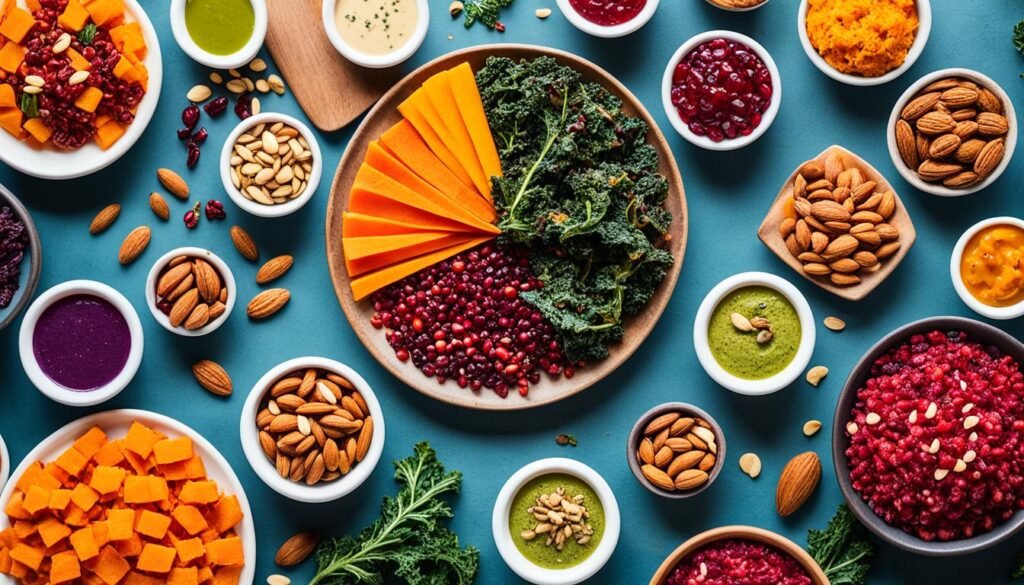
Incorporating these Kapha-balancing snacks and light meals into your diet can help keep your energy levels balanced, support digestion, and prevent Kapha-related symptoms. Embrace these Ayurvedic snack ideas and light meal options, and experience the benefits of a Kapha-friendly diet.
Kapha-Balancing Desserts
Even desserts can be enjoyed while balancing Kapha dosha. Kapha-balancing dessert recipes often incorporate ingredients like pear, cardamom, honey, and ginger, which help stimulate digestion and add a hint of sweetness. Desserts like soft cooked pears with cardamom or til laddoo (sesame seed rolls) with ginger can satisfy your sweet tooth without aggravating Kapha imbalances. These desserts are light, nourishing, and offer a perfect ending to a balanced meal.
Ayurvedic Tips for Balancing Kapha Dosha
In addition to incorporating Kapha-balancing recipes, there are certain lifestyle changes that can complement your efforts in balancing Kapha dosha. Making these Ayurvedic tips a part of your daily routine can help stimulate digestion, boost metabolism, and promote overall well-being and vitality.
Maintain a Consistent Meal Schedule
One of the key Ayurvedic tips for balancing Kapha dosha is to maintain a consistent meal schedule. Eating meals at regular intervals can help regulate your digestive fire and support efficient metabolism. Aim to have your meals at the same time every day to establish a healthy routine.
Practice Regular Exercise
Regular exercise is important for balancing Kapha dosha. Engaging in physical activity helps stimulate circulation, increase metabolism, and improve energy levels. Incorporate activities that are invigorating and dynamic to counteract the heaviness associated with Kapha imbalances.
Stay Hydrated
Hydration is crucial for balancing Kapha dosha. Drinking warm water throughout the day can help enhance digestion, promote detoxification, and support the overall balance of your doshas. Avoid cold beverages and opt for warm herbal teas or room temperature water instead.
Get Adequate Rest
Getting enough rest is essential for balancing Kapha dosha. Ensure you have a regular sleep schedule and aim for 7-8 hours of quality sleep each night. Creating a calm and peaceful sleep environment can help promote deep and rejuvenating rest.
Incorporating these Ayurvedic tips into your lifestyle can complement the benefits of Kapha-balancing recipes and help you achieve optimal balance and well-being.
Ayurvedic Approach to Kapha Imbalance
In Ayurveda, healing Kapha imbalances involves a holistic approach that takes into account various factors, including diet, lifestyle, and herbal remedies. Incorporating Kapha-balancing recipes is just one aspect of the Ayurvedic approach to addressing Kapha imbalance. Ayurvedic practitioners also consider individual needs and may recommend specific herbs, oils, and practices to support holistic healing. By embracing the principles of Ayurveda, you can tap into your body’s natural healing abilities and restore balance in all aspects of your life.
Ayurvedic Cooking for Kapha Dosha: A Journey to Balance
Ayurvedic cooking for Kapha dosha is a transformative journey that brings balance and nourishment to both the body and mind. By incorporating Kapha-balancing recipes into your diet, you can experience enhanced energy, improved digestion, and overall well-being. These recipes not only provide nourishment but also honour the principles of Ayurveda and cater to the unique needs of your body.
During this journey, you will discover the power of Ayurvedic cooking in promoting balance and vitality. By choosing ingredients and spices that pacify Kapha dosha, you can harmonize your body’s energy and support optimal health. These nourishing recipes are carefully designed to provide the right combination of flavors, textures, and nutrients that Kapha requires for balance.
Embrace the journey to balance and embark on a culinary adventure with Ayurvedic cooking for Kapha dosha. Explore the diverse flavours and aromas that Ayurvedic cuisine offers, and experiment with recipes that bring warmth, lightness, and nourishment to your meals. With each dish, you will be taking a step closer to attaining physical and mental harmony.
“Ayurvedic cooking for Kapha dosha is like embarking on a guided journey to find balance and vitality. Through mindful food choices and preparation, you can create meals that support your well-being and energize your body.”
Benefits of Ayurvedic Cooking for Kapha Dosha
- Enhanced energy levels
- Improved digestion
- Strengthened immune system
- Weight management
- Reduced lethargy and sluggishness
Key Elements of Kapha-Balancing Recipes
Ayurvedic cooking for Kapha dosha focuses on incorporating ingredients and spices that balance the qualities of Kapha, such as warmth, lightness, and stimulation. Some key elements of Kapha-balancing recipes include:
- Seasonal and locally sourced ingredients
- Spices and herbs that aid digestion and metabolism
- Warm and light cooking methods, such as steaming and sautéing
- Inclusion of pungent, bitter, and astringent tastes
By incorporating these elements into your cooking, you can create nourishing and balancing meals that not only satisfy your taste buds but also support your overall well-being.
Conclusion
Incorporating soothing Ayurvedic Kapha recipes into your diet can help you achieve balance and enhance your well-being. By following an Ayurvedic approach to balancing Kapha dosha, you can experience improved digestion, increased vitality, and a greater sense of overall balance. Embrace the healing power of Ayurveda and discover the transformative potential of Ayurvedic Kapha recipes. Start your journey to balance today and enjoy the many benefits of a balanced Kapha dosha.
FAQ
What are Ayurvedic Kapha recipes?
Ayurvedic Kapha recipes are specifically designed to balance the Kapha dosha and promote overall well-being and vitality. These recipes incorporate ingredients and spices that help reduce excess Kapha energy in the body, such as sweet potatoes, kale, ginger, lime, mung beans, basmati rice, and digestive spices.
How do Kapha recipes help in balancing Kapha dosha?
Kapha recipes help balance Kapha dosha by incorporating warm, light, and easy to digest ingredients. These recipes focus on reducing heavy, oily, and cold foods that can aggravate Kapha imbalances. They also include pungent, bitter, and astringent tastes, which are beneficial for reducing excess Kapha energy.
What are the signs of Kapha imbalance?
Signs of Kapha imbalance include lethargy, excess mucus, poor digestion, weight gain, a sluggish metabolism, and a feeling of heaviness in the body. Recognizing these signs is important in identifying the need to incorporate Kapha-balancing recipes into your diet.
What is the role of Ayurvedic diet in balancing Kapha dosha?
Ayurvedic diet plays a crucial role in balancing Kapha dosha. It focuses on incorporating warm, light, and easy to digest foods while reducing heavy, oily, and cold foods. Pungent, bitter, and astringent tastes are particularly beneficial for reducing excess Kapha energy.
What are some Kapha-balancing breakfast recipes?
Kapha-balancing breakfast recipes include ingredients such as sprouts, grated carrots, lettuce, lemon, and warming spices like black pepper and ginger. These recipes provide nourishment and energy without weighing you down, helping to kickstart your metabolism and keep Kapha imbalances at bay.
What are some Kapha-pacifying soups and stews?
Kapha-pacifying soup recipes incorporate warming spices like coriander, fenugreek, turmeric, and black pepper, along with vegetables like cauliflower and broccoli. These soups are light, easy to digest, and help stimulate digestion, metabolism, and circulation, reducing Kapha-related symptoms and promoting overall well-being.
What are some Kapha-balancing main entrees?
Kapha-balancing main entrees include dishes like kitchari, pearl millet flatbread, leafy greens with chickpeas, and salmon burgers. These recipes typically include ingredients like mung beans, basmati rice, and various spices to aid digestion, promote balance, and provide nourishment.
What are some Kapha-balancing snacks and light meals?
Kapha-balancing snacks and light meals include options like til laddoo (sesame seed rolls) with ginger or leafy greens salad with chickpeas. These snacks provide nourishment, support digestion, and help prevent Kapha-related symptoms such as sluggishness and weight gain.
Can I enjoy desserts while balancing Kapha dosha?
Yes, you can enjoy desserts while balancing Kapha dosha. Kapha-balancing dessert recipes incorporate ingredients like pear, cardamom, honey, and ginger, which help stimulate digestion and add a hint of sweetness. Examples include soft cooked pears with cardamom or til laddoo (sesame seed rolls) with ginger.
What are some Ayurvedic tips for balancing Kapha dosha?
Ayurvedic tips for balancing Kapha dosha include maintaining a consistent meal schedule, practicing regular exercise, staying hydrated, and getting adequate rest. These practices help stimulate digestion, boost metabolism, and promote overall well-being and vitality.
How does Ayurveda approach Kapha imbalance?
Ayurveda takes a holistic approach to healing Kapha imbalances, considering diet, lifestyle, and herbal remedies. In addition to incorporating Kapha-balancing recipes, Ayurvedic practitioners may recommend specific herbs, oils, and practices tailored to individual needs.
What is Ayurvedic cooking for Kapha dosha?
Ayurvedic cooking for Kapha dosha is a journey to balance and nourish the body and mind. By incorporating Kapha-balancing recipes into your diet, you can experience enhanced energy, improved digestion, and overall well-being.


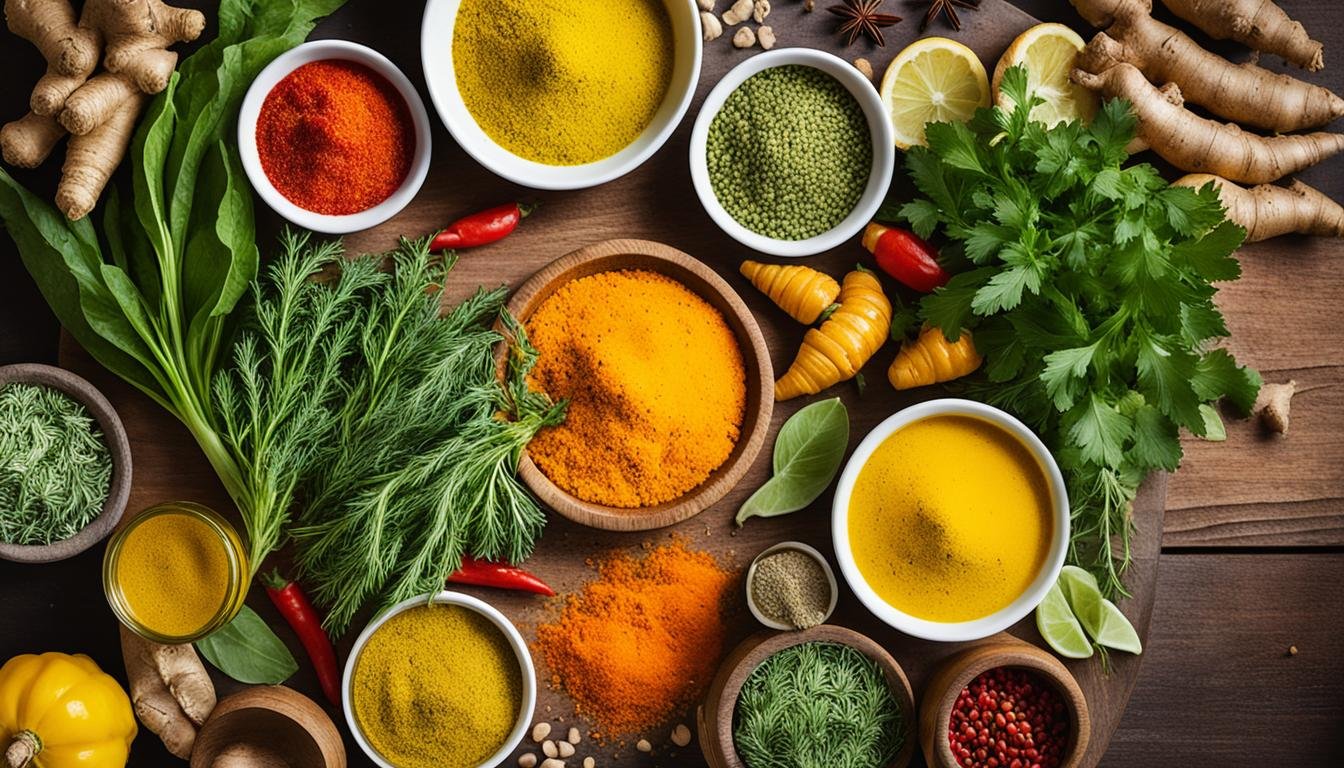


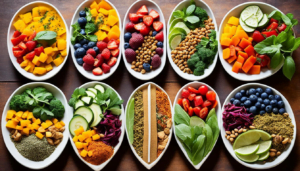
Pingback: Ayurvedic Seasonal Recipes
Pingback: Soothing Ayurvedic Dinner Recipes For Wellness